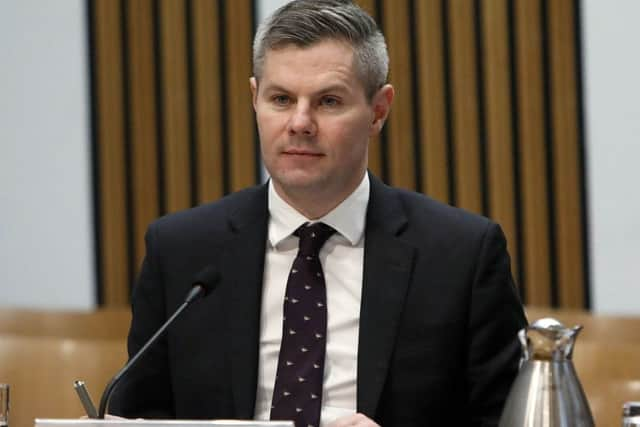Council leader backs ‘parking tax’ as Derek Mackay defends policy
A levy of around £400 a year per space is expected to be imposed on employers after Mr Mackay’s budget was passed last week thanks to a deal struck between the SNP-run administration and the Greens.
Businesses will be able to decide whether they pay the bill or pass it on to their employees but Edinburgh City Council leader Adam McVey said it would be a “lost opportunity” if companies and organisations absorbed the cost.
Advertisement
Hide AdAdvertisement
Hide AdMr Mackay was questioned on the tax – which has already been met with a backlash from motoring organisations and business leaders – when he appeared before MSPs on Holyrood’s finance committee yesterday. The finance secretary accused his opponents of “scaremongering” but admitted he has not carried out any economic analysis of the plan’s likely impact. He also conceded there was a case for “further exemptions” to workers other than just NHS staff.


Labour MSP Neil Bibby asked whether any government research had been carried out on the proposed workplace parking levy (WPL).
Mr Mackay said: “I haven’t undertaken any individual economic analysis. This is about empowerment of local government. It was a necessary budget concession because if there was no budget the consequences were that a £42.5 billion budget for Scotland would have gone down.”
NHS workers will be exempt and teaching unions are calling for schools to be excluded. Mr Mackay was asked if police, firefighters, apprentices, low income and rural workers could be similarly exempt. He said: “I do happen to think there’s case for further exemptions and I do happen to think that local authorities should look very carefully at local circumstances before taking this forward.”
Conservative MSP Alexander Burnett said he was aware of widespread concerns about the parking tax among rural teachers and college students.
The finance secretary said the powers already exist in “Tory-run England” and that the plans in Scotland are at an early stage. They will be taken forward by Holyrood’s rural affairs and connectivity committee as part of the Transport Bill and a consultation will be carried out by MSPs, he added.
Mr Mackay said: “This is at an early stage. If Mr Burnett wishes maybe he should advise some of the correspondents that he’s had on this matter of that, rather than scaremonger about who may or may not be paying this levy.”
He added: “Members shouldn’t scaremonger on this, should work with parliament in a constructive and collaborative fashion to get a scheme that’s right for the country and right for local authorities and right for local people.”
Advertisement
Hide AdAdvertisement
Hide AdHe said he held talks with business organisations to discuss the budget and that concerns over the workplace levy were “as nothing” compared with fears over the “financial catastrophe” of Brexit.
Mr Burnett said the parking levy has only been implemented once in England – in Nottingham – and that this was in conjunction with a tram scheme.
But Edinburgh has been pressing for a workplace parking levy for some time and Mr McVey said he hopes that if the city introduced a charge it will lead to fewer people driving to work, less congestion and pollution and more space for people to walk and cycle.
Mr McVey said: “The nature of this as a discretionary tax means the onus would be on the local councils that want to implement the policy to consult on things like exemptions, how it’s applied and the charging level. The detail is not going to be set nationally, it will be set locally.”
He said although there had been discussion of a parking levy, the council had not explored the details of how it should operate.
But he suggested a levy was likely to apply to the whole city rather than just the centre.
“On the low emission zone, we are looking to be quite bold and cover as much of the city as we can – that gives us a platform to jump from. I don’t imagine our thinking on a WPL would be very different.”
Mr McVey said he was open to looking at the options, adding: “We need to understand all the issues at play and respond to them. I think there will be exemptions to make it make sense.
Advertisement
Hide AdAdvertisement
Hide Ad“Hospitals are obvious, but there are others – teachers have already been mentioned. I think we need to look at it.”
He added: “Businesses in the city could see it as a charge on a parking space or a way to engage with their workforce to encourage active travel and public transport as a way of getting in”.